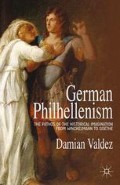Abstract
After a period of abandon and debauchery in London, where he wasted the funds of the German patrons who had sent him on a diplomatic mission, Johann Georg Hamann experienced a conversion and became a devout Lutheran Protestant.1 His learned polemic, Sokratische Denkwürdigkeiten, was published in 1759.2 Who could say, Hamann protested in that piece, that Socrates was not also to be reckoned among the figures sent by God, that “heaven anointed him its herald and interpreter, appointed him to that calling … which the prophets among the Jews possessed.”3 Like Luther, Socrates had imitated his father, in that he took and hacked away, that which was superfluous on the wood, and improved thereby the form of the work.4 In the beginning, therefore, was Martin Luther. His skepticism about the status of reason contributed to a powerful intellectual and artistic impulse in late eighteenth-century Germany known as the Sturm und Drang.5
Access this chapter
Tax calculation will be finalised at checkout
Purchases are for personal use only
Preview
Unable to display preview. Download preview PDF.
Notes
Johann Georg Hamann, Sokratische Denkwürdigkeiten; Aesthetica in nuce, ed. Sven-Aage Jørgensen (Stuttgart: Reclam, 1968).
Bernd Witte, “Goethe und Homer. Ein Paradigmenwechsel,” in Goethes Rückblick auf die Antike, ed. Bernd Witte and Mauro Ponzi (Berlin: Erich Schmidt, 1999), 23–24.
Goethe, Werke vol. 28 ed. Wilhelm Große (Frankfurt: Deutscher Klassiker Verlag, 1997).
Mauro Ponzi, “Eines Schattens Traum: Goethe und Pindar,” in Goethes Rückblick auf die Antike, ed. Bernd Witte and Mauro Ponzi (Berlin: Erich Schmidt, 1999), 39–57.
Montesquieu, Persian Letters, trans. Margaret Mauldon (Oxford: Oxford University Press, 2008), 175.
For a survey of the history of the appraisals of Athenian democracy, particularly in the modern history of ideas see Jennifer T. Roberts, Athens on Trial: The Antidemocratic Tradition in Western Thought (Princeton: Princeton University Press, 1994).
This was a rivalry more common in terms of poetry where Athens was often explicitly juxtaposed to Jerusalem. This is discussed by Sheehan and in the case of baroque and Enlightenment Germany by Joachim Dyck, Athen und Jerusalem: Die Tradition der argumentativen Verknüpfung von Bibel und Poesie im 17. und 18. Jahrhundert (Munich: Beck, 1977).
On the relationship between Herder and Rousseau see the long and detailed treatment by Hans M. Wolff, “Der junge Herder und die Entwicklungsidee Rousseaus,” Publications of the Modern Language Association 57 (1942), 753–819.
Johann Gottfried Herder, “Ideen zur Philosophie der Geschichte der Menschheit,” in Herder, Werke in Zehn Bänden vol. 6, Ideen zur Philosophie der Geschichte der Menschheit ed. Martin Bollacher (Frankfurt am Main: Deutscher Klassiker Verlag, 1989), 568.
Hans-Dietrich Irmscher, “Die geschichtsphilosophische Kontroverse zwischen Kant und Herder,” in Hamann, Kant, Herder: Acta des vierten Internationalen Hamann-Kolloquiums im Herder-Institut zu Marburg/Lahn 1985, ed. Bernhard Gajek (Frankfurt am Main: P. Lang, 1987), 113.
Hans-Dietrich Irmscher, “Goethe und Herder- eine schwierige Freundschaft,” in Johann Gottfried Herder: Aspekte seines Lebenswerkes, ed. Martin Kessler and Volker Leppin (Berlin and New York: De Gruyter, 2005), 256.
Immanuel Kant, “Review of Herder’s Ideas on the Philosophy of the History of Mankind,” in Immanuel Kant, Political Writings, ed. H. S. Reiss (Cambridge: Cambridge University Press, 1991), 201–220.
See Irmscher, “Nationalität und Humanität im Denken Herders,” Orbis Littterarum 49 (1994), 189–215.
On the problem of sociability in the eighteenth century, see John Robertson, The Case for the Enlightenment: Scotland and Naples 1680–1760 (Cambridge: Cambridge University Press, 2007) and Brooke, Philosophic Pride.
José de Acosta, Historia natural y moral de las indias. En que se tratan de las cosas notables del cielo, elementos, metales, plantas y animales dellas y de los ritos y ceremonias, leyes y gobierno de los indios, ed. Martí Soler (Mexico City: Fondo de cultura económica, 2006), 354–356.
Ludwig Curtius, “Goethe und Italien. Vortrag zur Paliliensitzung des Deutschen Archäeologischen Instituts in Rom,” Die Antike VIII (1932), 187.
Friedrich Nietzsche, “Vom Nutzen und Nachteil der Historie für das Leben,” in Friedrich Nietzsche, Sämtliche Werke: Kritische Studienausgabe, ed. Giorgio Colli und Mazzino Montinari (Berlin: de Gruyter, 1988), 243–334.
See Karl Philipp Moritz, “Götterlehre oder Mythologische Dichtungen der Alten,” in Moritz, Werke, ed. Horst Günther, vol. 2. (Frankfurt am Main: Insel, 1981).
Voltaire, Candide: Or Optimism, trans. Theo Cuffe (London: Penguin, 2005).
Ludwig Curtius, “Goethe und die Antike,” Neue Jahrbücher fuer wissenschaftliche Bildung 8, no. 4 (1932), 295.
See Johann Jacob Bachofen, “Versuch Über die Gräbesymbolik der Alten,” in Johann Jakob Bachofens Gesammelte Werke, ed. Ernst Howald, vol. 4 (Basel: Benno Schwabe, 1954).
Bernhard Neutsch, “Antiken-Erlebnisse Goethes in Italien und ihre Nachklänge,” Heidelberger Jahrbücher 7 (1963), 88.
See Nicholas Boyle, Goethe: The Poet and the Age, vol. 2, Revolution and Renunciation (1790–1803) (Oxford: Clarendon, 1991).
Copyright information
© 2014 Damian Valdez
About this chapter
Cite this chapter
Valdez, D. (2014). From Sturm und drang to Italy. In: German Philhellenism. Palgrave Macmillan, New York. https://doi.org/10.1057/9781137293152_8
Download citation
DOI: https://doi.org/10.1057/9781137293152_8
Publisher Name: Palgrave Macmillan, New York
Print ISBN: 978-1-349-45108-1
Online ISBN: 978-1-137-29315-2
eBook Packages: Palgrave History CollectionHistory (R0)

